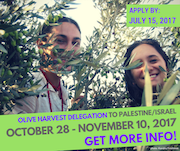< Reflection Three: Shine A Light
July 2017 Delegation | Interfaith Network for Justice Delegation
Co-Sponsored with American Muslims for Palestine, Jewish Voice for Peace, and the Presbyterian Peace Fellowship
Read reflections from this delegation:
- HOME: Interfaith Network for Justice in Palestine Delegation
- REFLECTION 1: Palestine (In and Out)
- REFLECTION 2: Israeli Army Segregates Us By Religion
- REFLECTION 3: Shine a Light
_______________________
Overview: The final collection of reflections from the Interfaith Network for Justice Delegation to Palestine/Israel begins with contributions from Eric E., Sophia H., and Elizabeth W. focusing on the sense of responsibility they feel upon returning to the US after the delegation.
Next, a powerful video documents the delegation's symbolic demonstration of solidarity with the people of Gaza - they sent a message of hope from just outside the closed border. Reflecting on Palestinian public art, Farah E.-J. also focuses on symbolism.
Lastly, Melissa N. pens an open letter to friends and family; and Elizabeth W. adds an untitled piece of prose.
Re-Alignment | Eric E. - Brooklyn, New York
Israel’s occupation of Palestine is so much worse than I ever imagined. That is not to say that I did not think that the occupation was a moral and human rights disaster before spending time there on the Just Faith ‘17 Delegation. I was just incapable of picturing the violence and the unpredictable arbitrary decisions Israel makes in order to make the daily life of Palestinians living under the occupation as miserable as possible. I was mentally unprepared for what I saw in Palestine. I don’t think anyone can be.
I’ve been trying to write about my experience since we arrived. It has been a challenge for me to put my thoughts down on paper/a computer screen. I was only able to write after returning to work yesterday, just four days after our delegation traveled to the border with Gaza to witness and pay respect to the Palestinian people there fighting for their lives. Yesterday, while I was on the subway on the way to work, an entire spectrum of emotions washed over me. I felt mournful for the ways that my community, the American Jewish community, has been complicit in upholding the occupation. I felt, and feel, anxiety because of how removed my life is from the urgency of the Palestinian struggle for freedom, dignity, and liberation. I felt anger towards people who know about the occupation and do not act to end it, and towards those that ignore the reality of the occupation. I was also afraid at how easy it could be to compartmentalize my experiences in Palestine, fly back to the US, and just get on with my routines.
Since I got home, I’ve been thinking a lot about Jews. For me, this isn’t anything new. I am a proud Jewish person and spend a lot of time in Jewish communal spaces. I think that the occupation exists in part because of the Jewish community’s historically-justified fear of annihilation. That fear has led the Jewish community to align itself with empire, militarism, and white supremacy. Those tendencies and ideologies have never been safe havens for Jews. We need a movement that will allow Jews to feel safe, that will recognize their fears, and that will show them how much we have to gain by realigning ourselves with our values and with oppressed communities around the world, starting with our Palestinian brothers and sisters.
Going to Palestine and learning what the occupation is like for those that endure its daily nightmare was a life changing experience. I cannot wait to go back, and I cannot wait to build the movement we will need to end the occupation as soon as possible.
Living in (False) Hope under Israeli Occupation | Sophia H. - Washington, DC
How are they getting away with this? This rhetorical question dogged me for days as I learned about the intricacies of Israel's occupation of Palestine:
- Concrete slabs 26 feet high tearing through Palestinian neighborhoods and farmlands
- More than 100 permits required for ordinary tasks like building a room in your house
- Palestinian children being sentenced to five to 20 years in prison for throwing stones, a common form of protest
- Israel planting trees in destroyed Palestinian villages to hide the evidence
- Almost 900,000 Jewish settlers occupying Palestinian lands, illegally and with Israel's approval
The list goes on.
Every day, stories and statistics angered and grieved me, but what bewildered me was that Israel has been doing this and knows it can keep doing this in plain sight, without suffering anything more than a slap on the wrist.
Israel freely breaches International Humanitarian Law and International Human Rights Law while Palestinians fight every minute to survive.
At Dheisheh Refugee Camp, established in 1949 near Bethlehem in the West Bank, we met with young Palestinians actively resisting Israel's colonial project. At LAYLAC, an organization run mostly by volunteers ages 14 to 30, Palestinian youth are finding an outlet for creative resistance. They come to share their thoughts, and they work together to run and shape projects that empower their community.
"Sometimes -- the majority of the time -- I lie to myself that I have hope," Murad, one of the youth at LAYLAC, told us. "But without hope we die. You need to create your hope."
That evening, we got to stay with families at Dheisheh As expected, the family I visited welcomed us warmly and offered us a flavorful array of pita, hummus, nuts, and plums. Perched on a couch covered in leopard print, I pointed to stacks of what looked like sandbags piled up between me and the dining table. "Hummus," my host mom said. Chickpeas. But of course! Their family owns a falafel shop down the street.
After laughing with three-year-old Amirah* and sipping on delicious tea, I was starting to think that maybe things were okay here. Then we found out that the reason we could stay in the upstairs apartment was that one of the sons in the family, Amirah's dad, was in prison. Amirah and her mom stayed with the rest of the family downstairs.
Around midnight, a series of pops and booms echoed outside our windows. In my grogginess I didn't know what I was hearing. In my ignorance I wished it would stop so I could sleep in peace. At breakfast the next morning, our host mom asked us, Did you smell gas last night?
Later I learned that Israeli army tanks had invaded the camp. They came just a few hours after their sabbath had ended. But because the resistors had figured out how the Israeli Defense Force moved, they surrounded them and eventually forced them to retreat. For one night, no one was hurt.
Hope is not an idea that just comes to you. It's not just a feeling or a reaction. Hope is action. It's fighting off military raids to keep your family and yourself alive for one more day. It's selling falafel and sharing food with strangers amid the daily violations of your rights. Hope is a fruit of self-love, of believing that freedom to move with dignity is your human right.
On our second day of the trip, a Palestinian activist told us that Israel is making life as unbearable as possible for Palestinians so that they'll leave and Israel can walk away clean. A member of our delegation said earnestly, "I hope that doesn't happen."
The activist responded, "Oh, we must make sure it doesn't happen. Hoping won't do anything. We have to act."
There are many reasons Israel is getting away with genocide. My inaction will not be one of them.
* name has been changed to protect privacy
Understanding Maryland through Palestine | Elizabeth W. - Westminster, Maryland
Growing up in suburban Maryland, I learned our state was rich with historic significance and contemporary culture. I visited Camp David, just an hour from my home, as a child knowing it as the retreat center for American presidents in the heart of the Appalachian mountains. I never learned that Camp David was home to the signing of the Oslo Accords, one of the greatest failures of Palestinian-Israeli negotiations that never published nor implemented its agreements. After twenty four years post-Oslo, my entire lifetime, Palestine has seen the failure of the international community to enact refugees' right to return and hold Israel accountable for its continual land annexation.
Returning home from Palestine this week has been illuminating and challenging to see the interconnectedness between my state and the homeland of Palestinians, a place equal in size and 5,860 miles away. I have noticed striking similarities in the way that farmers here take pride in being from Maryland, raising their children and tending to crops in the same place for generations, similar to the way that Palestinian farmers claim nine centuries of heritage in one place. I feel despairing to imagine if all the farmers in my county were forcibly displaced at the rate Palestinians have been, over 95% of the indigenous population. I have also seen that Maryland has largely erased its genocide against the Native American peoples, the Iroquois-speaking tribes of my county, while Israel denies the on-going ethnic cleansing of Palestine.
The connections become more concrete when I think about the role that the US, and Maryland specifically, play to finance the occupation. As home to the Maryland-Israel Development Center, a public-private partnership to support Israeli companies in the US, we also house the headquarters of more than two dozen Israeli companies in Maryland. In 2015, Maryland was Israel's 19th largest trading partner with $145 million in products exported from the state. The economy of my state is built on the exploitation and denial of rights to Palestinians through what my governor Larry Hogan calls "a real synergy" between us and Israel.
The complicity of the government and the business community has allowed one of my state senators, Benjamin Cardin, to co-author the most targeted bill against activism for Palestine at the federal level. The Israel Anti-Boycott Act would make it a felony to enact our constitutional right to divest from the Israeli occupation of Palestine, which the ACLU among other groups has denounced as a violation of free speech. The bill would make it impossible for US corporations and governments to sanction Israel for its crimes against humanity, including its eviction of Palestinian landowners while building illegal settlements, the imprisonment of children, and the disastrous siege on Gaza. This bill shows the codified and unconditional support of my government for an illegitimate and unjust state.
The call for justice in Palestine echoes onto the shores of my homeland, too, when I think of our shared struggles against police brutality. The Baltimoreans who protested the police murder of Freddy Gray, a young Black man killed in 2015, were met with the same blinding US-manufactured tear gas that our Palestinian neighbors in Jaffa breathed last week. My friend Amed was arrested for protesting the shooting of a young unarmed Palestinian man, his life taken by militant policemen with seven bullets to the chest. We also learned that Jews of color are heavily policed within the state of Israel using similar tactics of racial profiling as we see targeting our minority communities. It is no coincidence that the United States and Israel have exchanged police trainings and surveillance technologies for fifty years, strengthening the logic of the occupation in US cities and counties. In funding a police state, both governments steal critical education funding: Jerusalem currently lacks 2,000 classrooms for its Arab citizens while Baltimore City Public Schools has a $130 million dollar deficit.
While I do not see the remnants of destroyed Palestinian villages or the segregation wall jutting through Maryland, I do see the oppressive systems that operate in both contexts and the collective struggle for freedom we share. I remember the words of a Palestinian host who told us: "You are resistance fighters, too, when you work for the liberation of Palestine."
One of our leaders at Dheisheh Refugee Camp, Murad, reminded us that it was our responsibility, not our kindness, to work for justice in Palestine. "This is your duty," he told us.
As a person of faith and a resident of this state, I know that none of us is free until Palestinians see their dignity and human rights restored, to see the day when families are reunited across the apartheid wall and farmers can again water their crops. The least that they ask is we stop funding their oppression.
Two weeks ago, I stepped onto the soil of a land that will shape my understanding of every other place, including my home. To our friends working for liberation in Palestine and Israel, we will not forget you. In the words of Black activist Assata Shakur:
"It is our duty to fight for our freedom.
It is our duty to win.
We must love each other and support each other.
We have nothing to lose but our chains."
VIDEO: Shine a Light on Gaza
Last week, the delegation traveled to the edge of the Gaza Strip with a message of solidarity and commitment. Members of delegation joined together to shine a light on Israel's abuses of Palestinian rights in the Gaza Strip.
As Raji Sourani of the Palestinian Centre for Human Rights told our delegation via video-meeting from Gaza:
“This is what we want as a Palestinian people, is to feel and have dignity. We are human beings. We are no less than any other people. We have a right to self-determination... I can assure you, we are strong. We are the stones of the valley. We have been here forever, and will continue to be here forever.”
Israel bombed Gaza yesterday. Again.
video produced by Jewish Voice for Peace
|
Art as Torture (Art as Survival) | Farah E.-J. - Columbia, Missouri
At Al-Fara'a prison, a child was forced to paint a mural for the enjoyment of his captors, his torturers. This beautiful talent he had was co-opted and used as an instrument of his torture alongside humiliation, sleep deprivation, confinement, and much worse. So he painted his village as he remembered it, as he imagined it, on a wall in the dining hall where the Israeli officers who held him and other captive children ate their meals in between torturing the children in this prison. The mural lives on in the building that has been transformed into a community center for the local children.
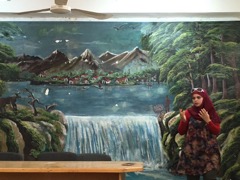
Art as resistance
The Tent of Nations farm is filled with art. Murals that insist on celebrating Palestinian culture, Palestinian life, in the midst of demolition orders and uprooted trees. This art is a community effort. Everyone contributes - Palestinian children from the area, volunteers from all over the world, and the family themselves.
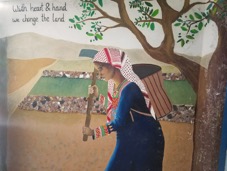
Perhaps the most ubiquitous example of art as resistance in Palestine, is the art you can find all over the apartheid wall that cuts through and annexes Palestinian land. Everyone wants to leave their mark on this most blatant form of oppression and mass imprisonment. Qaawim, qaawim. (Resist, resist).
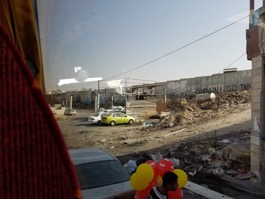
Art as remembrance
In the Dheisheh refugee camp, near Bethlehem, art is used to remember those killed by Israeli occupation forces. An artist who painted the faces of victims of Israeli state violence stopped making art after he jokingly promised two boys he'd paint them too - and then found himself painting their faces a couple years later. He reappeared to repaint all the murals in color, to celebrate the life of each shaheed (martyr).
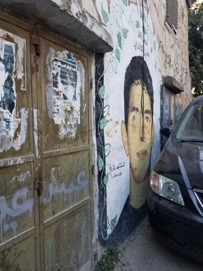
In the cave where the Nasser family lived, a family tree is painted on the supporting column in the middle of the space. If the walls don't remember and bear witness, who will?
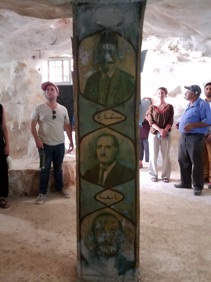
Upon My Return to the US I Write this Open Letter | Melissa N. - Dorchester, Massachusetts
Dear all my relatives, friends and barely acquainted friends who support the Zionist project of Israel,
Please sit with me for a while, I have too many stories that scream to be told.
A twelve year old boy picks up a stone and throws it at a fully geared soldier. The boy is sent to a prison for 20 years. Maybe bargained down to 18. His family will not be able to visit because they will not get permits to travel.
Or they will have to supply his prison under House Arrest.
What will his mother and father do? What of his brothers and sisters? His classmates? His future children?
8,000 child prisoners since 2000
Every fact has thousands of faces not counted in that number.
Which will touch you more? Is it worth it to you to hear about the lives that are being crushed?
The efforts to simply live life?
Will you flinch at the hatred that is being planted?
Yes. Maybe. Because you still have
Your own pain.
Your own story.
Your own place in this world.
All that is yours does not erase these facts.
Is the terror of a child and stones because you believe so much in David and Goliath? David is from the Dheishah refugee camp. The IDF came in the middle of the night and pulled him out of his house.
How can I tell you about the frustration that rams throughout this
Area A
Area B
Area C
Plan D. Plan Dalet for ethnic cleansing.
Every
Letter of the alphabet screams
And can I tell you that despite the frustration
Everyday
Palestinians also pick up their pens, their brushes, their dreams, their heartbeat
And they find the cracks in the wall.
Their happiness bears no relation to Happiness.
Let me know how to reach you.
Yours in solidarity with life,
Melissa
Untitled | Elizabeth W. - Westminster, Maryland
You can bomb the grape and olive farmers off their land of their great-great-great ancestors, you can build walls around their sheep pastures to kill their livelihood, you can plant foreign pines over the rubble that burn in forest fires, you can say you made the desert bloom,
You can strip the truth of Arab histories from the textbooks, you can take the teachers from their classrooms, you can build prisons designed to torture children, you can tell their neighbors they are to be enemies, you can put machine guns in the hands of seventeen-year-olds and turn them into monsters, you can call the children riding their bikes a threat to public safety,
You can fund innovation of bombs and guns and cameras to export across the world, you can build a wall ten meters high to keep out the refugees, you can call your mission 'security,'
You can take the water and the light from the houses where the people remain, you can destroy the roads and the fields to build segregated communities, you can build fancy buildings on land of bones and ashes,
You can beat the elderly as they pray in the holiest mosque, you can cancel surgeries and cancer treatments for patients with no access to electricity, you can bomb neighborhoods and let people suffocate with no way out but the sea,
You can steal children in the night and beat them in front of their parents, you can tear families apart who share blood ties on opposite sides of the wall, you can steal the bodies of those who die behind bars and never let their families rest,
You can surround the refugee camp to shock the most vulnerable out of their dreams with the sounds of bullets firing before dawn, you can make the young men labor like slaves to build the settlements on the land you stole from them, you can make it illegal to pick sage from the mountains,
You can deny people the right to live with their spouses, you can lie to foreign governments while you strip the rights of anyone who isn't white and Jewish, you can make it impossible to see taste hear smell touch the occupation from the other side,
You can try to hide everything that makes you the most well-funded apartheid on earth
But you cannot take away the people's memories, you cannot steal their stories, their weavings, their photos that survived the Nakba, you cannot take their maklouba recipes and faith that God is greater even than soldiers who can take your life while you pray,
You cannot take the love of a mother fighting to bring her son home, you cannot stop the father from building a twelve meter ladder to risk his life to climb the wall,
You cannot take away their hope to return home tomorrow even when it is an illusion, you cannot destroy their determination that every court case is a fight for their freedom,
You cannot stop the young men from picking up stones to show they still have the power to throw them, you cannot stop the masses of bodies gathered in the streets to mourn when one of their heartbeats was stolen, you cannot keep his friends from stealing the body from the hospital to bury it before your police take it,
You cannot hide the ruins and the overturned stones and cemetery graves that mark the families who resided here before, who called this very square of land their birthplace,
You cannot mask the glistening of the golden dome above the city streets, the queen of Jerusalem keeping the love of her children alive,
You cannot keep the farmers from replanting their olive trees even after you have burned a thousand, you cannot stop the Bedouin families from rebuilding their homes for the fiftieth time this year,
You cannot stop the four-year-old from memorizing the chants of his first demonstrations, you cannot take the laughter from the child who first learns to play marbles on the stones in the old city,
You cannot keep the people on the other side of the wall and the world from waking up, from realizing that prisons and barbed wire fences do not make us safe,
You cannot lower the flag from being raised in the hearts and minds of people across the planet, remembering the words of the people who say this land is the heart of who we are
You cannot imprison others without putting yourself in chains,
You can stop the people's imaginations, their voices crying for justice, no matter how hard you try, you cannot hide the truth from the sun
You cannot steal the love from the heart that will be pierced for the freedom of Falastin, today, tomorrow, and the next day,
when the people of the land and the land of the people here in God's sight will forever remain
We invite delegation participants to comment on and react to the experiences they have during our Israel/Palestine delegations in written Trip Reflections.
Individual delegates contribute pieces to these reflections. As such, reflections are not comprehensive accounts of every meeting or experience, but impressions of those things that most impact individuals. Submitted reflections may be edited for clarity or brevity. Trip reports do not necessarily reflect the views of Interfaith Peace-Builders, American Muslims for Palestine, Jewish Voice for Peace, the Presbyterian Peace Fellowship, trip leaders, or delegation partner organizations. We hope you enjoy reading and we encourage you to share these reflections with others.
DONATE: Support IFPB in sending more trips
TRAVEL: Sign Up To Learn About Future Trips
| Select a digest to view reflections: | delegation home | 1 | 2 | 3 | |



